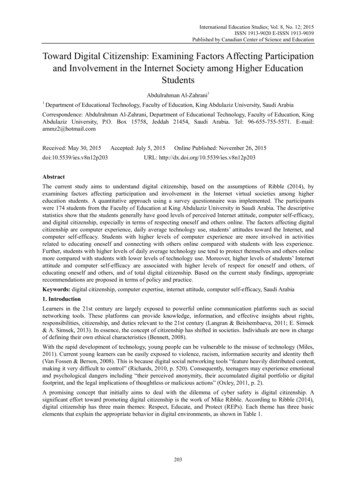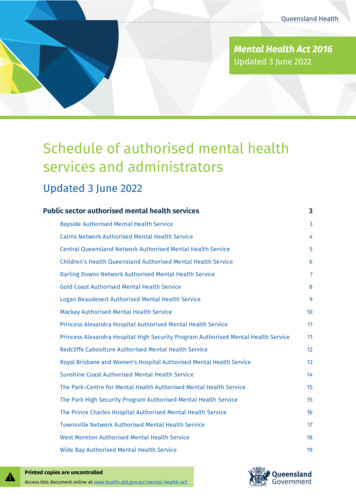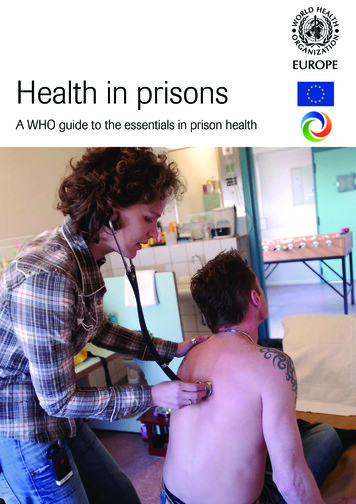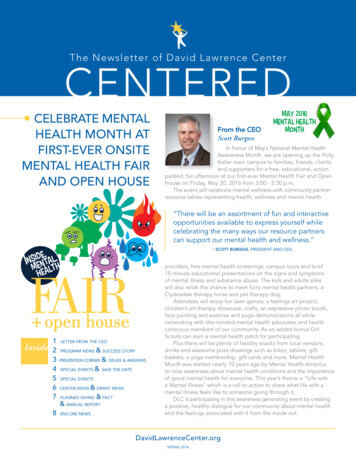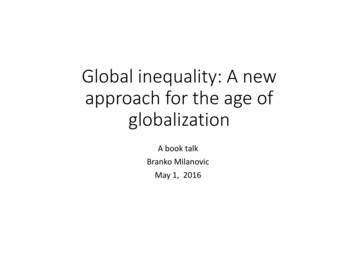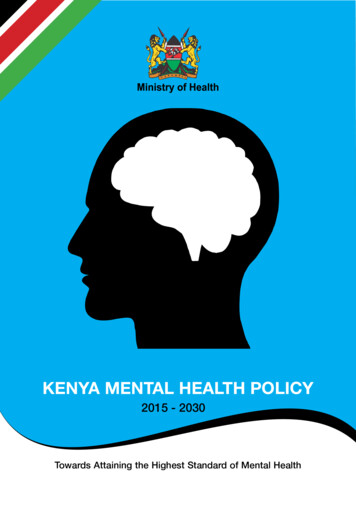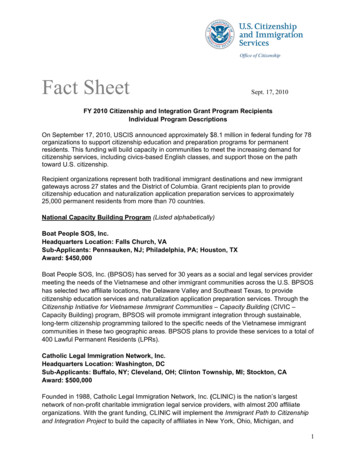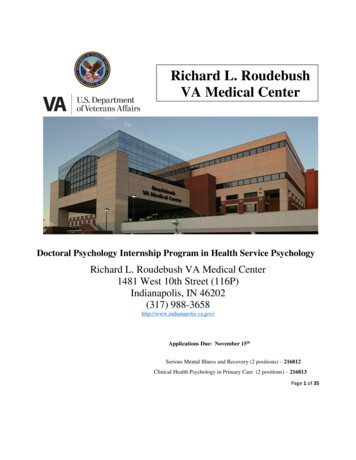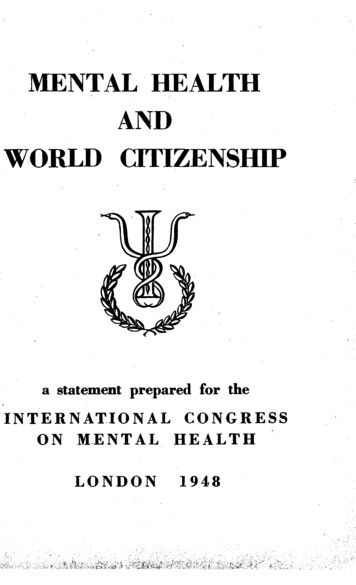
Transcription
MENTAL HEALTHANDWORLD CITIZENSHIPa statement prepared for theINTERNATIONAL CONGRESSON MENTAL HEALTHLONDON19.48
MENTAL HEALTHANDWORLD CITIZENSHIPa statement prepared for theInternational Congress on Mental HealthLondon, 1948CONTENTSForeword.Summary in English and FrenchIntroductionProblems of Mental Health in relation to Human DevelopmentProblems of Mental Health in the Life of Society . .Mental Health and World Citizenship.Recommendations :I. Introduction.II. Principles underlying the Practice of Mental Health .Ill . Planning and Organisation of National Mental HealthServices .IV. International Recommendations .Published by theWORLD FEDERATION FOR MENTAL HEALTH
FOREWORDWith one or two minor verbal alterations and proof corrections, thispamphlet is an exact reprinting of the statement produced by the International Preparatory Commission for the - International Congress onMental Health which was held in London in August, 1948 . It will appearin the Proceedings of the Congress, but many people who are concernedwith the issues dealt with in this statement have expressed a wish fora wider, distribution of the original document .The International Preparatory Commission was a group of twenty-fivepeople who met from July 24th to August 8th, 1948, in order to study theresults of the work of about five thousand men and women of varyingprofessions who through the previous year had been working in discussiongroups of Preparatory Commissions in some twenty-seven countries . .The international group set out to evaluate these findings and to preparea statement to serve as a basis for consideration at the Congress . Thecomposition of the group was as follows :Oswaldo Camargo-Abib, M.D., Superintendent of Mental Health Services,Bahia State, Brazil.John Cohen, Ph.D. (Technical Secretary), Lecturer in Psychology,University of Leeds.H. V . Dicks, M .D., Formerly Professor of Psychiatry, University of Leeds .Prof. J . C. Flugel, D.Sc ., Chairman,, Programme Committee of theCongress. . Formerly Assistant Professor ofPsychology, University College, London .Oscar L . Forel, M .D., Lecturer in Psychiatry, University of Geneva .Lawrence K. Frank, A.B . (Chairman). Director, Caroline ZachryInstitute of Human Development, New YorkCity.Frank Fremont-Smith, M .D., Vice-President of the International Committee for Mental Hygiene, and Chairman ofthe Executive . Medical Director, JosiahMacy, Jr . Foundation, New York City .Otto Klineberg, Ph.D., Director of the project, " Tensions affectinginternational understanding," Social SciencesDept, UNESCOProfessor of Psychology, Columbia University.J. Kockebakker, Ph .D., Head of the Mental Health Division, Institutefor Preventive Medicine, Leiden .Prof. William Line, Ph.D., Professor of Psychology, University of Toronto ;Director of Research, National Committeefor Mental Hygiene .Margaret Mead, Ph.D., Associate Curator of Ethnology, AmericanMuseum of Natural History . New York City.Prof. D. Mitrany, D .Sc ., Adviser on international affairs to Lever Bros .,and Unilever Ltd ., London.2
The Rev. E. F . O'Doherty, Ph.D ., Assistant to Professor of Psychology,University College, Dublin .A. Querido, M .D., Director, Dept . of Mental Hygiene, Public HealthServices, Amsterdam .Prof. Carlo de Sanctis, M .D., Assistant Director, Psychiatric Hospital,Rome.Prof. T. S . Simey, M.A ., Professor of Social Science, University ofLiverpool .Prof. Torgny Segerstedt, Ph .D., Professor of Sociology, University ofUpsala .Prof. Jean Stoetzel, D .es L ., Professor of Social Science, University ofBordeaux .Harry Stack Sullivan, M .D ., Director, Washington School of Psychiatry .with Members of Congress StaffNina Ridenour, Ph.D., Executive Officer, International Committee forMental Hygiene.Sibyl Clement Brown, M .A., Congress Programme Secretary . PsychiatricSocial Worker. Formerly Tutor, MentalHealth Course London School of Economicsand Political Science .E. M . Goldberg, Assistant Programme Secretary .Psychiatric SocialWorker : Formerly Regional RepresentativeNational Association for Mental Health .J Helen Speyer, M.A., Executive Secretary to American Central Commission on Children and War . Psychologistand Social Worker.Advisers and ConsultantsDaniel T. Blain, M .D., Medical Director, American Psychiatric Association .1 J . R. Rees, M .D., President of the Congress .I George S. Stevenson, M .D., Medical Director, National Committee forMental Hygiene, New York.It may be of interest to readers to know rather more about thebackground of some of the members of the International PreparatoryCommission and the working process of the Commission .Although the list above indicates the present task or the primarydiscipline with which each of the I .P.C. members is connected, themajority of them have had a wider background of training and experiencethan may be suggested by their present occupation . To mention a fewexamples : a number of them have had prolonged experience of teachingchildren in addition to more recent work of teaching undergraduate andgraduate students . One member had had experience of the practicalapplication of the social sciences in his capacity as Welfare Adviser inone of the Colonies ; one Professor of Sociology had previously held aChair in Moral Philosophy and several of the psychologists are alsoqualified in sociology and have wide experience of community education .3
The group as a whole can be said, therefore, to have experience ineducational, social and industrial, psychology ; sociology ; psychiatric socialwork ; psychiatry and psychoanalysis ; philosophy ; theology ; culturalanthropology ; political science ; medical research and medical and general,administration .It may be thought that because this group was composed of men andwomen of broad outlook and background it was comparatively easy forthem to reach a concensus of opinion on these large issues which werebefore them . This was not so . The process of " multi-disciplined "thinking and working is a complicated one which is not just a combinationof the points of view of different disciplines . In order to achieve worthwhile results the different approaches need to be integrated so as toconstitute a new concept reflecting the many-faceted situations of reallife. This implies that the International Preparatory Commission like,any other multi-professional, international group, had to struggle hardtowards a point of integration where a true group product , becomesa possibility: It had to overcome international and inter-disciplinarytensions . Indeed these tensions may possibly have been more severethan in other groups, because they were engendered by strong personalitiesof considerable standing in -their own profession and country holdingclearly differentiated views which they were able to defend with unusualverbal facility . When once a group of this kind arrives at a common basisupon which to work, this represents an . achievement of considerablesignificance .The actual process of work developed along the following linesOn arrival each member was given a set of volumes containing the carefullyedited work of the Preparatory Commissions in the various participatingcountries, and time was set aside for the study of these documents . Aftermembers had given each other some information about their respectivebackgrounds, it was found necessary to " clear the ground " by answeringseveral fundamental questions . Each member was asked to writea statement on " What is Mental Health," " What Constitutes a GoodSociety," and " What is World Citizenship ." The answers to thesequestions threw significant light on the different approaches to theseproblems by the various members . They helped to clarify basic conceptsand indicated the extent to which there was a common background .Gradually, in general discussion based on the study of the reports and onthe original contributions by members of the Commission the differentsections of the document emerged . Recognising the central position of thefamily and the importance of human development in the unfolding of allhuman relationships, a section on human development was the first to beconsidered . It also' became clear that an introduction or " preamble " tothe statement would have to be drafted, which like an overture wouldintroduce readers to the various themes of the document . Soon the plansfor the other sections crystallised from the discussions in the plenarysessions and working parties were set up to draft the various sectionaldocuments . From this point onward the plenary sessions were superseded by the intensive activity of these working parties . Each draftingcommittee held several sessions in which provisional drafts were discussed,torn to pieces and re-written, in order to be revised again . Finally, on4
a certain date, each working party circulated their final drafts to allmembers for consideration and discussion in full session . Many importantcriticisms were made and the drafts were amended again by the smallcommittees in the light of the suggestions and comments of the wholegroup .Finally, they selected an editor with a small sub-committee to put thesections of the report together and mould them into one document .He set to work and within twenty-four hours the whole of the editedreport was in the hands of every member of the Commission . Then theprocess of revision and criticism started afresh and once more each sectionwas discussed and considerably revised, some sections coming back fordiscussion to the plenary sessions several times . This refining processcontinued to the last moment of the Commission's meeting .This procedure of drafting, discussion and re-writing was cumbersomeand time-consuming, but it meant that each member of the group hadparticipated in the process and that the end result can therefore be trulydescribed as a collective product . There was an astonishing absence ofpossessive and proprietary feeling about individual contributions anda remarkable tolerance of criticism . The group became so closelyintegrated during the course of its work, and confidence between membershad increased to such an extent, that quite naturally a piece of writing ordrafting would be handed to the person or persons who at that momentseemed most competent to deal with it .It is undoubtedly true that the document shows the sign of manyhands, but this may be due to pressure of time rather than to divergenceof views . The general structure and ideas expressed show cohesion anda unfied trend of thought .Language difficulties on an international, inter-professional andpersonal level were encountered and led to confusion and tension duringthe initial stages . It was instructive to see how, as time went on, peoplebegan to understand each other more easily . Not only did their earbecome attuned to each other's accents and peculiarities of speech, buttheir willingness to overcome barriers had grown to a notable extent .Some of the statements may appear to be " lukewarm " rather than" epoch-making." The reason for this was the necessity to arrive at someuniversal agreement . If, therefore, strong statements were found to beunacceptable to some members or could not readily be translated intoother languages, they were abandoned in favour of statements of thegreatest common denominator acceptable to all .Finally, it should be mentioned that the members of the InternationalPreparatory Commission were very conscious and regretful of the factthat representatives of eastern and far-eastern cultures were absent .A definite attempt was made to face the situation by making the statementso minimal and fundamental that it could apply to as many diversesystems of culture and values as possible .*****This statement was presented to all the 2,000 members attending theCongress on Mental Health, from approximately 50 countries . In eachof the six plenary sessions of the Congress the second speaker was a
member of the International Preparatory Commission who tried topresent the results of this group's thought and experience . Very carefulattention had been given in the preparation of these speeches to the reportssent in by the national Commissions . The drafts were read and discussedby I.P.C . colleagues and, as a result, many of the papers were considerablymodified in their final presentation . During the course of the Congressa considerable number of small international groups met consisting mainlyof those who had previously been in national groups at home . As theirtask they undertook to consider and comment on the sections of thisstatement .which particularly concerned them and much valuable workwas carried out with great enthusiasm .On the last day of the Congress, while no attempt was made to getexact agreement on every statement, which would clearly have beenimpossible in so large a meeting, the whole Congress, with the exceptioni of one member, gave its general approval to the statement, regarding it asa basis for further action, and expressed the wish that it should be sentto the appropriate public bodies concerned .6
SUMMARYMen and women everywhere, profoundly disturbed by world-wideconfusion and conflict, are asking : " Can the catastrophe of a thirdworld war be averted ? " " Can the peoples of the world learn toco-operate for the good of all ? " " On what basis is there hope forenduring peace ? "To consider these questions and related problems from the combinedviewpoints of sociology, psychology, psychiatry, social work, anthropology,political science, philosophy and theology, a group of twenty-four representatives of these professions from ten countries have been in conferencefrom the 24th of July to the 8th of August, 1948, at Roffey Park, Sussex.This group had available reports from three hundred preparatory commissions composed of about five thousand social scientists, psychiatristsand others, who have been working during the past year in twenty-seven !countries in anticipation of the International Congress of Mental HealthThe statement of the International Preparatory Commission maybe summarised as followsStudies of human development indicate the modifiability of human lbehaviour throughout life, especially during infancy, childhood andadolescence, by human contacts . Examination of social institutions inmany countries shows that these also can be modified. These newlyrecognised possibilities provide the basis for improving human relations,for releasing constructive human potentialities and for modifying socialinstitutions for the common good.The social sciences and psychiatry also offer a better understandingof the great obstacles to rapid progress in human affairs . Man and hissociety are closely interdependent. Social institutions such as family andschool impose their imprint early in the personality development of theirmembers, who in turn tend to perpetuate the traditional pattern to whichthey have been moulded . It is the men and women in whom thesepatterns of attitude and behaviour have been incorporated who present theimmediate resistance to social, economic and political changes .Thus prejudice, hostility or excessive nationalism may becomedeeply embedded in the developing personality without awareness onthe part of the individual concerned, and often at great human cost .Perhaps the most important contribution of the social sciences intheir joint approach to the urgent problems facing mankind is therecognition of the plasticity of human behaviour and social institutionsand of the resistance of each to change . In order to be effective, effortsat changing individuals must be appropriate to the successive stages ofthe unfolding personality, while in the case of a group or society, changewill be strongly resisted unless an attitude of acceptance has first beenengendered .Principles of mental health cannot be successfully furthered in anysociety unless there is progressive acceptance of the concept of world7
tfftcitizenship. World citizenship can be widely extended among all peoplesthrough the applications of the principles of mental health.The concept of world citizenship implies loyalty to the whole ofmankind . Such new loyalty need not conflict but rather embracestraditional loyalties to family, community and nation, which alone areno longer sufficient for the protection of the interdependent peoples ofthe world .Programmes for social change to be effective require the joint effortsof psychiatrists and social scientists working in co-operation withstatesmen, administrators and others in positions of responsibility .The statement expands these themes, includes an outline of acceptableprinciples, practices and professional ethics for those working in the fieldof mental health and human relations, and closes with recommendationsaddressed to appropriate agencies of United Nations, to the newly formedWorld Federation for Mental Health, to other non-governmentalinternational organisations, and to national and local organisationsconcerned with the betterment of mental health and human relations .R suME : Profondement troubles par 1'etat de confusion et detension qui regne partout, beaucoup d'hommes et de femmes dans tousles pays se posent ces questions : " Est-il possible d'eviter la catastrophed'une troisieme guerre mondiale ? "" Les peuples sont-ils a meme d'apprendre a co-operer dans l'interetet pour le bien de tous ? "" Sur quoi peut-on fonder 1'espoir d'une paix durable ? "Ces questions et les problemes qui sly rattachent ont ete etudies encommun par un groupe de vingt-quatre personnalites qui tenterentd'unir en une synthese les points de vue de leurs sciences respectivessociologie, psychologie, psychiatrie, anthropologie, services sociaux,sciences politiques, philosophie et theologie . Venus de dix paysdifferents, ils se sont reunis a Roffey Park, Sussex, du 24 juillet au 8 aout1948 . Ce groupe avait a sa disposition le materiel provenant de troiscents commissions preparatoires totalisant plus de cinq millepersonnel, specialistes des sciences sociales, psychiatrie et autres, quiavaient travaille au cours des douze derniers mois, dans vingt-sept pays,en vue du Congres international de la Sante Mentale .Le contexte arrete par cette commission preparatoire internationalepeut etre resume ainsi qu'il suitL'etude du developpement de la personnalite invite a conclure quele comportement humain peut etre modifie, pris au tours de la vie,notamment durant la petite enfance, 1'enfance et l'adolescence, par1'effet des contacts humains . D'autre part, 1'examen des institutionssociales de nombreux pays montre que celles-ci aussi sont susceptiblesde modification . Ces possibilites recemment admises fournissent unebase pour l'amelioration des relations humaines ; elles incluent les8
virtualites constructives de l'homme, la possibilite d'une modificationdes institutions sociales en vue du bien commun .Les sciences sociales et la psychiatrie augmentent nos connaissancesde l'etendue et de la complexite des obstacles qui s'opposent a la solutiondes problemes humains . 11 existe une etroite interdependance entre lesindividus et la societe. Les institutions sociales, par exemple la familleet 1'ecole exercent precocement leur profonde influence sur lespersonnalites en voie de developpement, et celles-ci a leur tour tendenta perpetuer le systeme des traditions suivant lequel elles ont ete modelees .Ce sont les hommes et les femmes qui ont integre ces systemes d'attitudeset de comportements a leur personnalite qui opposent des resistancesimmediates aux changements sociaux, economiques et politiques . Ainsi .prejuges, hostilite, excel de nationalisme peuvent s'intriquer profondementdans la personnalite en formation, a l'insu de 1'individu et souvent au'prejudice de 1'humanite.Il est possible que la contribution la plus importante des diversessciences sociales examinant les problemes urgents qui se posent a1'humanite, reside dans la double constatation suivante : d'une part,celle de la plasticite du comportement humain et des institutionssociales ; d'autre part, leur mutuelle resistance a tout changement.Pour titre efficaces, les efforts pour modifier les individus devront titreadaptes aux etapes successives de la personnalite en formation . D'autrepart, en ce qui concerne les groupes et les societes humaines, la resistancea tout changement restera considerable tant - qu'i1 n'y aura pas, auprealable, une attitude d'acceptation .Les principes' de la sante mentale ne peuvent, en aucune societe, titredeveloppes avec succes tant que 1'idee d'une citoyennete universelle Westpas acceptee. La citoyennete universelle peut titre largement diffuseeparmi les peuples par 1'application des, principes de la sante mentale .L'idee de citoyennete universelle implique un loyalisme envers1'ensemble de l'humanite . Un tel loyalisme n'entre pas necessairementen conflit aver, mais plutot inclus les loyalismes traditionnels envers lafamille, le groupe et la nation, lesquels a eux seuls ne suffisent plus aassurer la protection de tous les peuples desormais interdependants .Pour . titre efficaces, les programmes impliquant des changementssociaux rquierent la participation des specialistes des sciences socialeset des psychiatres travaillant en collaboration avec les hommes d'Etat,les hauts fonctionnaires et tous les dirigeants responsables.Le texte ci-apres de la Commission developpe ces themes . 11 comporte une esquisse des principes, des moyens et des conceptions professionnelles a l'intention de ceux qui travaillent dans le domain de lasante mentale et dans celui des relations humaines . 11 se termine par despropositions adressees aux services competents des Nations Unies, a laFederation Mondiale pour la Sante Mentale, de creation recente, auxautres organisations internationales non officielles, ainsi qu'aux organisations nationales et regionales qui s'occupent de 1'amelioration de la santementale et des relations humaines .
" We have to be able to be at peace amongthe different cultures and religions withoutsacrificing what is differently cherished andworshipped . . . How the necessarilyprivate and personal minds can becomeharmoniously minded is one of the studieswithin psychiatry and in all the search andresearch of the sciences that worktogether on and for man . . . .ADOLF MEYER.10
INTRODUCTIONThe purpose of this Statement is to outline the tasks immediatelyahead, and indicate where there is scope for the application of theprinciples and practice of mental health in the broadest sense . Countriesrepresented at this Congress differ in cultural traditions, economicresources, provision of health and social services, size and density ofpopulation, and facilities for the development of the social sciences andpsychiatry . These differences make it extraordinarily difficult to adapt tolocal needs the knowledge gained from these sciences .This Statement is addressed to administrators, workers in the socialsciences, in psychiatry, medicine and allied professions, and to thinkingpeople everywhere. Their attention is drawn to the urgency of consideringthe problems of to-day and to-morrow, not only in the field of health andsocial relations, but also in wider issues of great moment .The pursuit of mental health cannot but be a part of a system ofvalues . In this Statement, values associated with Western civilisation are,perhaps, implicit in much that is said . Indeed, the very effort to reach ahigh degree of mental health is, in some respect, an expression of Westerncultural achievement. But this by no means implies that mental healthas understood in Western countries is in any sense necessarily at variancewith the sense in which it is understood in other countries . On thecontrary, it may be that here might be found a basis for common humanaspiration .Here it is possible only to indicate the promise which the socialsciences and psychiatry hold out of reducing the toll of human waste andsuffering and of promoting social well-being . Fulfilment of this promiserests largely on the hope of full co-operation between the social scientistand ' the administrator, who should be fully aware of the new vistas of .human achievement opened up by the social sciences . While far morehas to be learnt than is now known, it is evident that we stand on thethreshold of a new epoch of the science of man, and in the accomplishmentof this aim, public opinion, enlightened by a broad system of adult,education, has an important part to play .Systematic explorations of the human mind in health as, well as indisease, carried out by psychiatrists and others in recent decades, givesome conception of the nature and dimensions of the problems facingmankind to-day .These investigations have revealed the immensepossibilities for constructive effort inherent in human societies and thelatent goodwill in the individual . They have also helped us to understandhow vast destructive forces may be let loose upon the world, for example,in the form of war, or in the more ominous camps for mass exterminationwhich have outraged humanity ; and they point to ways in which suchdistortions of life may be prevented . Few societies of which we haveknowledge are wholly free from distortion of human impulse, sometimeson a large scale, such as racial oppression, or industrial conflict . Further11
more, there is no evidence that the burden of mental disorder is in anyway lessened. On the contrary, in some of the countries most advancedindustrially, mental disability is more extensive than any other form ofdisease .Profound disquiet following two world wars, and the fear of a thirdcatastrophe, compel us to face the problems of better education for lifewith one another . The warning by eminent scientists of the dread possibilities of biological and atomic warfare cannot be ignored . Uppermost,perhaps, in the minds of people to-day is the question whether the humanintellect, building upon the accumulating knowledge in the sciences ofman and the wisdom of the past, can avert the calamity of a third worldwar . There is unrest in many countries, and a ferment of ideas . Old ordersof society are yielding to new . Even in the same society there are oftenviolently conflicting aspirations. A widespread perplexity has arisen fromthe disappearance or decay of old values and loyalties .There is a growing belief that peace requires a world-wide foundation,and that whether realised or not, the security of each rests on a two-foldallegiance, to his country and to the community of the world . Men andwomen, in their anxiety, look for guidance in world affairs just as theyseek help in dealing with the problems of their own community . They1 ask for practical ways of improving the relations between the differentrpeoples of the world, individually and collectively . Many seek in inter! national organisations now possibilities of achieving peace and worldorder .Since the turn of the century, extension of scientific methods to thedomain of personal and social life has opened up new fields of enquirycomparable in scope with the whole range of natural science . It is for the.purpose of focusing the attention of all social scientists and psychiatristson these contemporary issues that this international gathering has beenconvened.The sciences concerned with the life of man in society must becomemore responsive to human needs in this situation . This Congress is notorganised to initiate social reform but to help to infuse a scientific spiritinto the movements of reform and reconstruction under way in manycountries, especially in those countries which suffered most from therecent war.The time has come to enlarge the concept of medicine to includemental ills and their systematic prevention . This calls for sustained teamwork by those who devote themselves to the study of man and society .The application of the principles of psychiatry and the social sciences tohuman problems has often fallen short of success because of the complexnature of the task and because of the great difficulty of foreseeing theoutcome .The sciences concerned with mental health derive from intensivefirst-hand studies of human beings and their inter-relationships in variouscultures, of normal and abnormal development, of normal groups andinstitutions, and of the pathology of group functioning . They have12
benefited also from the experience of the physician, the pastor and theteacher, whose findings have been tested by modern methods of investigation and analysis . The fields of work from which this detailed knowledgehas been acquired include health and social services, education andindustry, community organisations, the defence services and publicadministration .It is clear that no world-wide standards of mental health services canbe set up since countries differ so much in economic resources andcultural setting . No general standards, universally applicable, can therefore be devised for providing a given number of psychiatric hospitals,clinics, etc., per unit of population . This question is simply part of thewhole problem of correctly allocating the effort and often limited resourcesof a community for the common good .A society undergoing rapid change, may readily accept principles ofmental health in the construction of a new educational system or a publichealth plan, while societies which are already highly developed in theserespects may actually be found more resistant . Illiteracy, simple levels ofsocial organisation and wide dispersion of population are not necessarilyobstacles to the promotion of mental health principles . By the timelyuse of appropriate methods, it may be possible to avoid many of the evilswhich are found in the more industrialised societies .It is of primary concern to the psychiatrist, physician or nurse, theapplied psychologist, anthropologist, economist, political scientist, lawyerminister of religion, social worker or member of other allied professions,to discover ways of releasing human poten
Problems of Mental Health in the Life of Society . . Mental Health and World Citizenship . Recommendations: I. Introduction. II. Principles underlying the Practice of Mental Health . Ill. Planning and Organisation of National Mental Health Services. IV. International Recommendations. Published by the WORLD FEDERATION FOR MENTAL HEALTH

